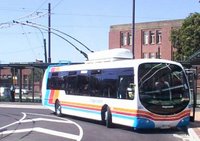Re-wired
I didn't go to the Save the Trolleys meeting yesterday, partly because I'd run out of time and energy, but mostly because it was already redundant. On Saturday, the Dominion Post reported that the regional council and Land Transport NZ had got their act together and sorted out a funding agreement to keep the trolleys running.
 Not only that, but the trolleys will be completely refitted, along the lines of these prototype trolleys that have been on our streets for a couple of years. Most of the problems that critics of the trolley system didn't like were due to the age and poor condition of the old buses themselves, rather than the concept: they are slow, cramped, grotty, inaccessible and vulnerable to dewiring and power cuts. As the DomPost article and the regional council's website point out, the refurbished trolleys will:
Not only that, but the trolleys will be completely refitted, along the lines of these prototype trolleys that have been on our streets for a couple of years. Most of the problems that critics of the trolley system didn't like were due to the age and poor condition of the old buses themselves, rather than the concept: they are slow, cramped, grotty, inaccessible and vulnerable to dewiring and power cuts. As the DomPost article and the regional council's website point out, the refurbished trolleys will:- be faster;
- have 51 seats rather than 40;
- be refitted with decent seats;
- have low floors and wheelchair access;
- have redesigned poles (to halve the incidence of dewiring); and
- include auxiliary diesel power to get them out of the way if there's a power cut.
Whether or not the wires are unsightly is a matter of opinion, and personally I've never minded them. There are much more beautiful cities (such as Rome, Vienna and Amsterdam) that are full of tram wires, and you rarely hear people complaining about them. Besides, Wellington's a messy, busy, eclectic city full of signage, contrasting architecture, advertising hoardings and other visual clutter. It's part of what I love about this place, and a few wires hardly seem out of place among all that. And if it's a choice between wires and diesel fumes, I know which I'd choose.
As for inflexibility, I see that as a benefit rather than a problem: you can choose a home based upon proximity to a trolley line and have reasonable certainty that the line won't be moved in a hurry. That's not the case with a bus route, which can be changed upon the whim of the bus operators.
It looks like the only potential barrier now is Commerce Commission approval. Apparently, they are concerned that Stagecoach will have a monopoly on the trolley bus market. Do passengers really care? I'd have thought that most people would rather have a single, straightforward, integrated transport system than a plethora of private operators with incompatible timetables and ticketing. Let's hope that "free market" ideology doesn't get in the way of providing high quality, sustainable infrastructure.



4 Comments:
When we first moved to Wellington we were instanly reminded of European cities. The main reason for this was the wires. They create a closeness to the city that works well with the architecture etc.
Keep the trolleys just make em better.
Hooray for the Trolley Buses!
Thank gods, the Trolly's really help keep the noise down and adding even more thumping and grinding engine noise wouldl just make the place worse. Welly doesn't pay much attn to its noise polution and it is a noisy place, quite beyond those obnoxious walk signals -- geez, they may be blind but they're not deaf.
The visual pollution matter is such rot. Interesting that the current generation of trolleys were bought when they cost not much more than diesels, and running costs were lower. Oil prices aren't high enough yet to make trolleys efficient in their own right, especially given the huge gains in diesel efficiency. The other problem is that the trolley market changed radically with the end of the Cold War - no more ultracheap eastern european manufacturers to keep the price down.
I like them, I'd pay to keep them myself, but this is probably the last generation of them before ultra low emission hybrids are more economic. The cost of the overhead wire infrastructure is what really kills the economics.
Post a Comment
<< Home